Unit 6 An interesting country知识清单(含答案)-2023-2024学年六年级英语下学期期末核心考点集训
文档属性
| 名称 | Unit 6 An interesting country知识清单(含答案)-2023-2024学年六年级英语下学期期末核心考点集训 | 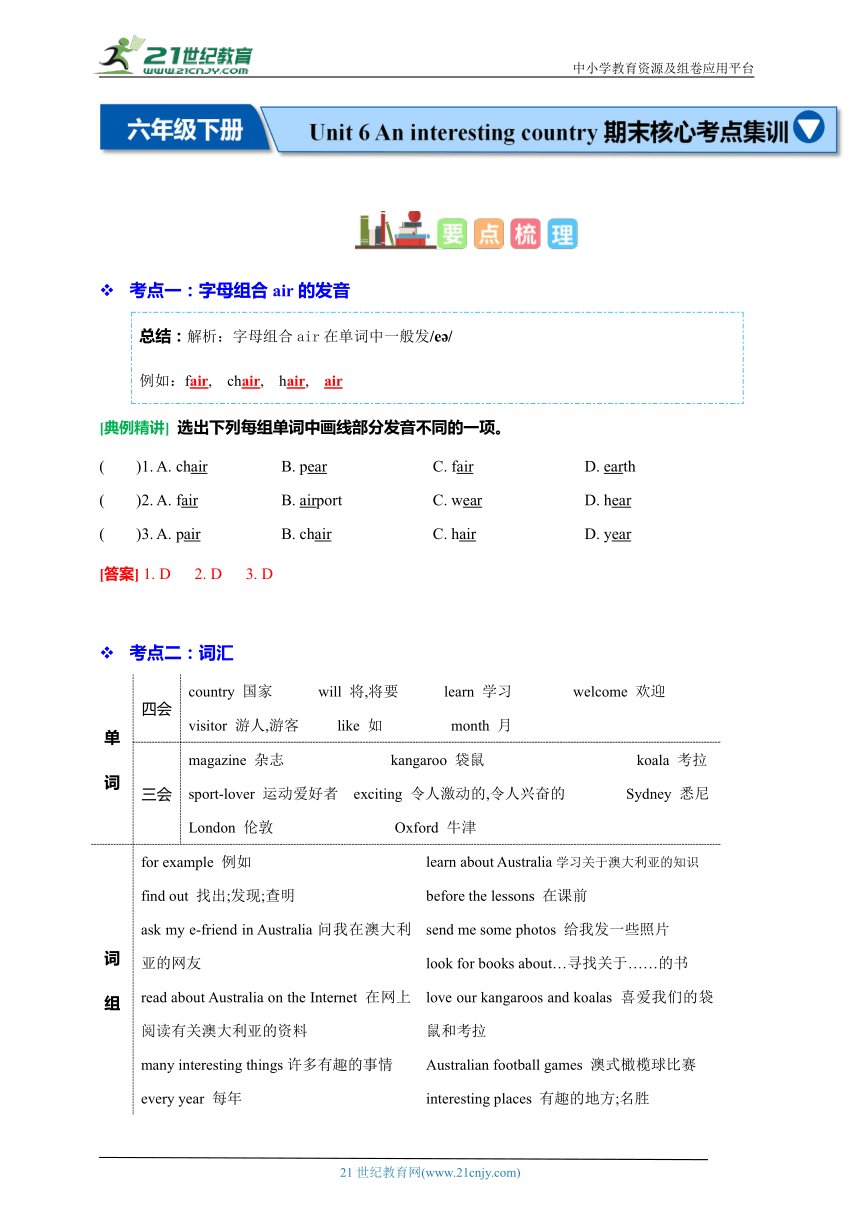 | |
| 格式 | docx | ||
| 文件大小 | 402.3KB | ||
| 资源类型 | 试卷 | ||
| 版本资源 | 牛津译林版 | ||
| 科目 | 英语 | ||
| 更新时间 | 2024-05-20 16:38:30 | ||
图片预览

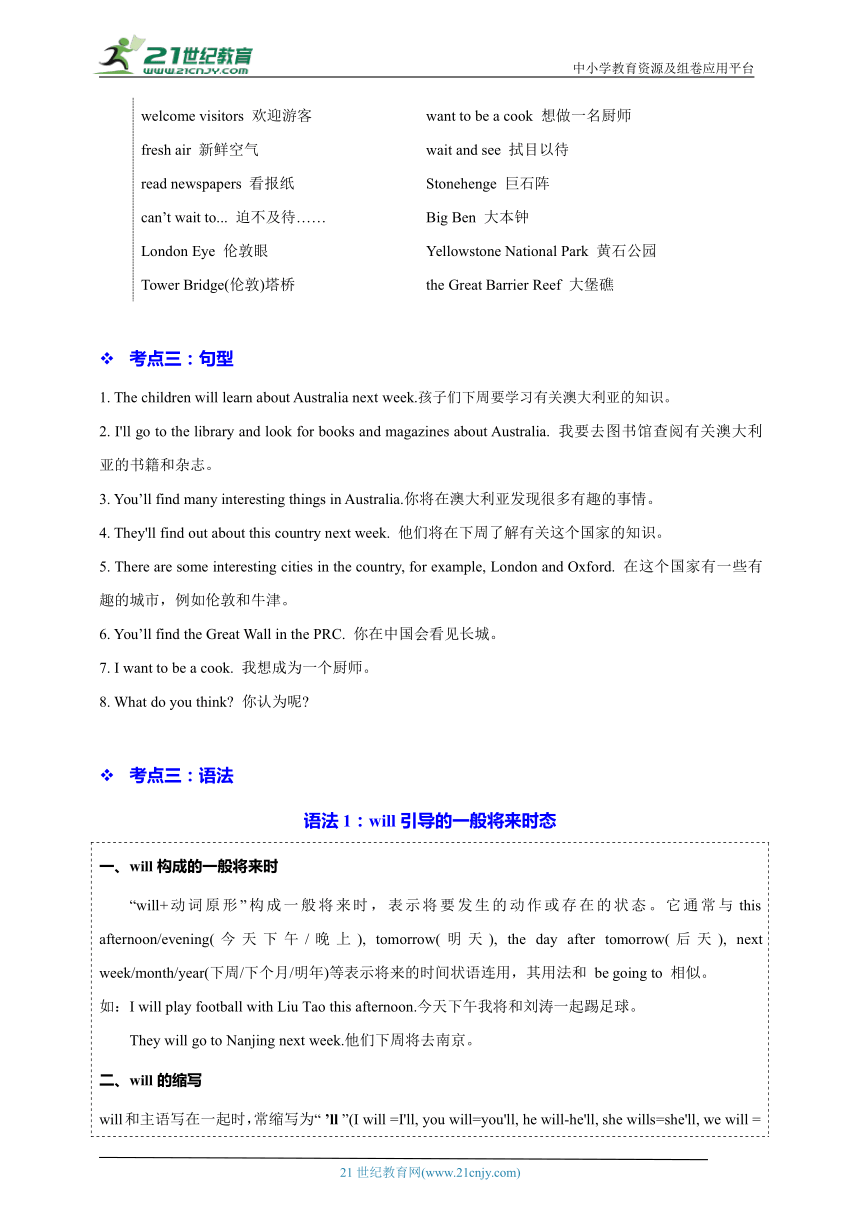
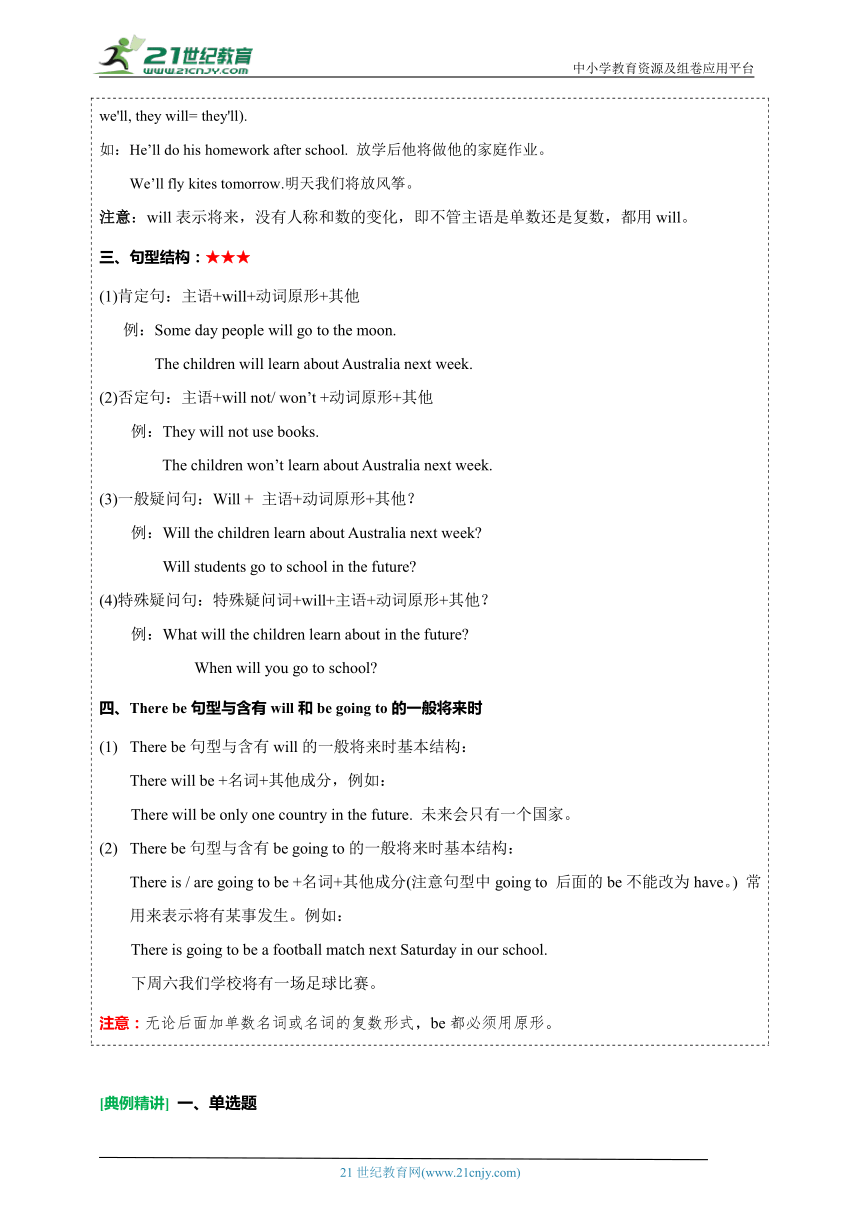
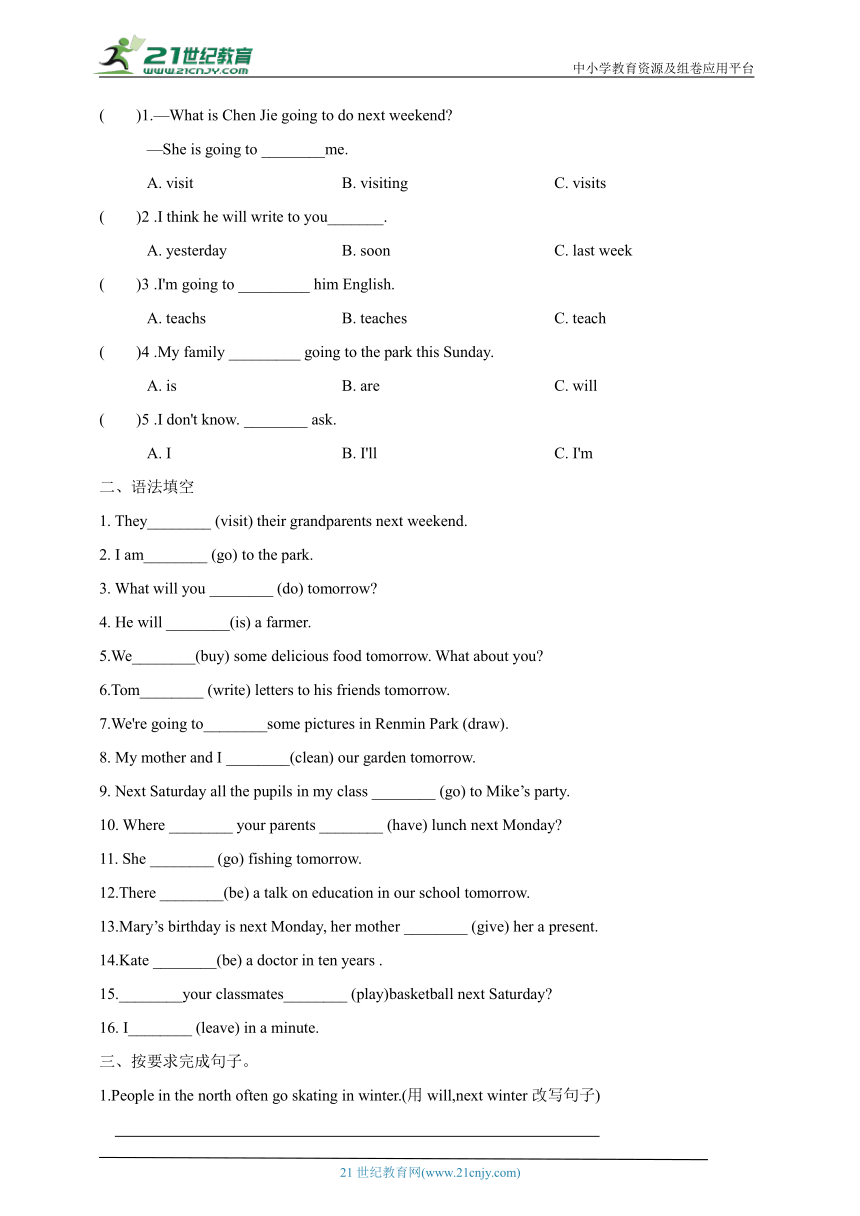
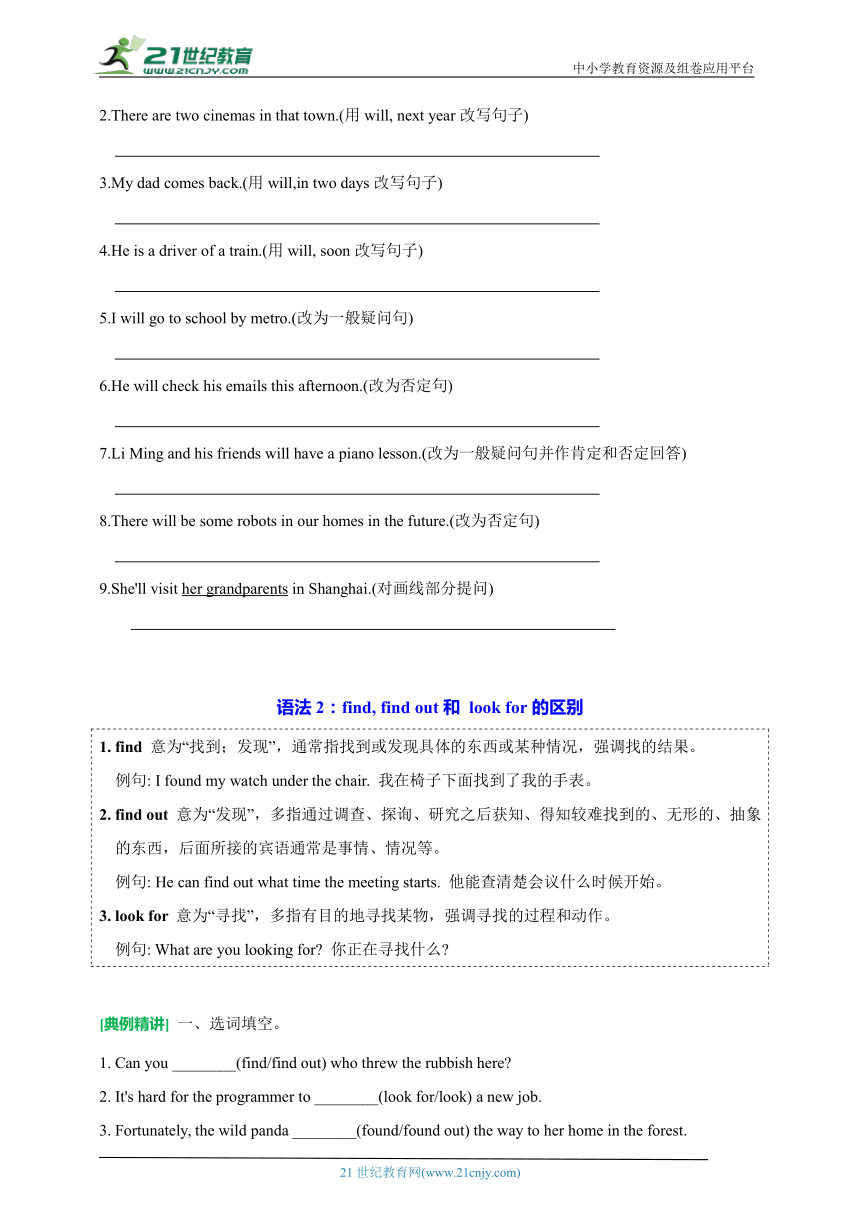
文档简介
中小学教育资源及组卷应用平台
考点一:字母组合air的发音
总结:解析:字母组合air在单词中一般发/e / 例如:fair, chair, hair, air
[典例精讲] 选出下列每组单词中画线部分发音不同的一项。
( )1. A. chair B. pear C. fair D. earth
( )2. A. fair B. airport C. wear D. hear
( )3. A. pair B. chair C. hair D. year
[答案] 1. D 2. D 3. D
考点二:词汇
单词 四会 country 国家 will 将,将要 learn 学习 welcome 欢迎 visitor 游人,游客 like 如 month 月
三会 magazine 杂志 kangaroo 袋鼠 koala 考拉 sport-lover 运动爱好者 exciting 令人激动的,令人兴奋的 Sydney 悉尼 London 伦敦 Oxford 牛津
词组 for example 例如 find out 找出;发现;查明 ask my e-friend in Australia问我在澳大利亚的网友 read about Australia on the Internet 在网上阅读有关澳大利亚的资料 many interesting things许多有趣的事情 every year 每年 welcome visitors 欢迎游客 fresh air 新鲜空气 read newspapers 看报纸 can’t wait to... 迫不及待…… London Eye 伦敦眼 Tower Bridge(伦敦)塔桥 learn about Australia学习关于澳大利亚的知识 before the lessons 在课前 send me some photos 给我发一些照片 look for books about…寻找关于……的书 love our kangaroos and koalas 喜爱我们的袋鼠和考拉 Australian football games 澳式橄榄球比赛 interesting places 有趣的地方;名胜 want to be a cook 想做一名厨师 wait and see 拭目以待 Stonehenge 巨石阵 Big Ben 大本钟 Yellowstone National Park 黄石公园 the Great Barrier Reef 大堡礁
考点三:句型
1. The children will learn about Australia next week.孩子们下周要学习有关澳大利亚的知识。
2. I'll go to the library and look for books and magazines about Australia. 我要去图书馆查阅有关澳大利亚的书籍和杂志。
3. You’ll find many interesting things in Australia.你将在澳大利亚发现很多有趣的事情。
4. They'll find out about this country next week. 他们将在下周了解有关这个国家的知识。
5. There are some interesting cities in the country, for example, London and Oxford. 在这个国家有一些有趣的城市,例如伦敦和牛津。
6. You’ll find the Great Wall in the PRC. 你在中国会看见长城。
7. I want to be a cook. 我想成为一个厨师。
8. What do you think 你认为呢
考点三:语法
语法1:will引导的一般将来时态
will构成的一般将来时 “will+动词原形”构成一般将来时,表示将要发生的动作或存在的状态。它通常与this afternoon/evening(今天下午/晚上), tomorrow(明天), the day after tomorrow(后天), next week/month/year(下周/下个月/明年)等表示将来的时间状语连用,其用法和 be going to 相似。 如:I will play football with Liu Tao this afternoon.今天下午我将和刘涛一起踢足球。 They will go to Nanjing next week.他们下周将去南京。 will的缩写 will和主语写在一起时,常缩写为“ ’ll ”(I will =I'll, you will=you'll, he will-he'll, she wills=she'll, we will = we'll, they will= they'll). 如:He’ll do his homework after school. 放学后他将做他的家庭作业。 We’ll fly kites tomorrow.明天我们将放风筝。 注意:will表示将来,没有人称和数的变化,即不管主语是单数还是复数,都用will。 句型结构:★★★ (1)肯定句:主语+will+动词原形+其他 例:Some day people will go to the moon. The children will learn about Australia next week. (2)否定句:主语+will not/ won’t +动词原形+其他 例:They will not use books. The children won’t learn about Australia next week. (3)一般疑问句:Will + 主语+动词原形+其他? 例:Will the children learn about Australia next week Will students go to school in the future (4)特殊疑问句:特殊疑问词+will+主语+动词原形+其他? 例:What will the children learn about in the future When will you go to school There be句型与含有will和be going to的一般将来时 There be句型与含有will的一般将来时基本结构:
There will be +名词+其他成分,例如: There will be only one country in the future. 未来会只有一个国家。 There be句型与含有be going to的一般将来时基本结构:
There is / are going to be +名词+其他成分(注意句型中going to 后面的be不能改为have。) 常用来表示将有某事发生。例如: There is going to be a football match next Saturday in our school.
下周六我们学校将有一场足球比赛。 注意:无论后面加单数名词或名词的复数形式,be都必须用原形。
[典例精讲] 一、单选题
( )1.—What is Chen Jie going to do next weekend
—She is going to ________me.
A. visit B. visiting C. visits
( )2 .I think he will write to you_______.
A. yesterday B. soon C. last week
( )3 .I'm going to _________ him English.
A. teachs B. teaches C. teach
( )4 .My family _________ going to the park this Sunday.
A. is B. are C. will
( )5 .I don't know. ________ ask.
A. I B. I'll C. I'm
二、语法填空
1. They________ (visit) their grandparents next weekend.
2. I am________ (go) to the park.
3. What will you ________ (do) tomorrow
4. He will ________(is) a farmer.
5.We________(buy) some delicious food tomorrow. What about you
6.Tom________ (write) letters to his friends tomorrow.
7.We're going to________some pictures in Renmin Park (draw).
8. My mother and I ________(clean) our garden tomorrow.
9. Next Saturday all the pupils in my class ________ (go) to Mike’s party.
10. Where ________ your parents ________ (have) lunch next Monday
11. She ________ (go) fishing tomorrow.
12.There ________(be) a talk on education in our school tomorrow.
13.Mary’s birthday is next Monday, her mother ________ (give) her a present.
14.Kate ________(be) a doctor in ten years .
15.________your classmates________ (play)basketball next Saturday
16. I________ (leave) in a minute.
三、按要求完成句子。
1.People in the north often go skating in winter.(用will,next winter改写句子)
2.There are two cinemas in that town.(用will, next year改写句子)
3.My dad comes back.(用will,in two days改写句子)
4.He is a driver of a train.(用will, soon改写句子)
5.I will go to school by metro.(改为一般疑问句)
6.He will check his emails this afternoon.(改为否定句)
7.Li Ming and his friends will have a piano lesson.(改为一般疑问句并作肯定和否定回答)
8.There will be some robots in our homes in the future.(改为否定句)
9.She'll visit her grandparents in Shanghai.(对画线部分提问)
语法2:find, find out和 look for的区别
1. find 意为“找到;发现”,通常指找到或发现具体的东西或某种情况,强调找的结果。 例句: I found my watch under the chair. 我在椅子下面找到了我的手表。 2. find out 意为“发现”,多指通过调查、探询、研究之后获知、得知较难找到的、无形的、抽象的东西,后面所接的宾语通常是事情、情况等。 例句: He can find out what time the meeting starts. 他能查清楚会议什么时候开始。 3. look for 意为“寻找”,多指有目的地寻找某物,强调寻找的过程和动作。 例句: What are you looking for 你正在寻找什么
[典例精讲] 一、选词填空。
1. Can you ________(find/find out) who threw the rubbish here
2. It's hard for the programmer to ________(look for/look) a new job.
3. Fortunately, the wild panda ________(found/found out) the way to her home in the forest.
4. The careless student is ________(looking for/looking) his meal card in the playground.
二、单项选择。
( )1. The students want to ________ about the history of China.
A. find B. find out C. look for
( )2. Please help me ________ my mobile phone. I can't ________it.
A. look for; find B. find; find out C. find out; find
( )3. Mrs Green wanted to talk to Jim, but she ________him in the classroom.
A. didn't find out B. doesn't look for C. didn't find
一、用所给词的适当形式填空。
1. Because of Super Typhoon Saola, they ________(not travel) to Xiamen yesterday.
2. I want ________(read) about how ________(cook) Kung Pao Chicken on the Internet.
3. People in Nanjing welcome ________(visit).
4. The students found many ________(interest) things in the museum.
5. I can send ________(she) some postcards after the holiday.
二、单项选择。
( )1. Liu Tao and Helen went to the library to ________ about Canada.
A. find B. find out C. look for
( )2. The boys in Class 2 are having an ________ running race. The girls are cheering for them ________.
A. exciting; excitedly B. excited; excitedly C. exciting; excited
( )3. Where is Mike from ________he come from the US
A. Is B. Do C. Does
( )4. There are some ________ in our school.
A. Australia B. Australias C. Australians
( )5. Liu Tao will ________ me some photos________ the famous places in Australia.
A. send; to B. send; of C. sends; of
三、从Ⅱ栏中选出与Ⅰ栏句子相对应的答句。
Ⅰ Ⅱ
( )1. What's the weather like today A. No. He will visit Canada.
( )2. How many sport-lovers are there B. It's fine.
( )3. Are there any interesting places in the city C. There are ten.
( )4. Will Mike visit Australia next week D. Yes, there are.
( )5. What's Liu Tao doing now E. He's reading about Nanjing on the Internet.
四、根据上下文和图片提示,完成对话。
Wang Bing is chatting with his e-friend Liu Tao in Beijing.
A: Hello, Liu Tao. I'll go to Beijing ________ my family next week.
B: Really
A: Yes. Can you tell me something ________ Beijing
B: Sure. Beijing is ________ old and beautiful ________. Many people
come ________ every year.
A: Do you think what ________ I will visit first
B: The ________ , of course.
A: Are there any lovely ________ in Beijing Zoo
B: Yes. Monkeys and ________ are very interesting. ________to Beijing!
A: Thank you.
五、将下列句子重新排序,组成一段完整的对话。
A. Will you visit Xi’an
B. Oh, I see. I can tell you something about Xi'an.
C. Of course. My uncle lives in Xi’an. I go there every year.
D. What are you doing, Su Hai
E. Really
F. No. We will learn about Xi’an next week. I want to find out about this city before the lessons.
G. I'm looking for some pictures about Xi'an.
H. That's great!
G C
六、阅读短文,判断正(T)误(F)。
Australia is one of the greatest countries in the world. It is in the southern hemisphere (南半球). So when it is hot summer in China, it is cold winter in Australia. Australia is big, but the population(人口) is small. The population of Australia is nearly the same as that of Shanghai, a city in China.
Australia is famous for its sheep and kangaroos. After a short drive from any town, you will find yourself in the middle of white sheep. Sheep, sheep, everywhere is sheep. Have you seen a mother kangaroo It has a“bag”in front of its body. The mother kangaroo keeps its baby kangaroo in the“bag”. It is very interesting, isn’t it
( )1. When it is winter in China, it is summer in Australia.
( )2. The population of Australia is as large as that of China.
( )3. Australia is famous for its sheep and kangaroos.
( )4. The mother kangaroo always carries a bag on its back.
( )5. The father kangaroos keep their baby kangaroos in the“bag”.
[参考答案]
语法1:
一、1. A 2. B 3. C
4. B 主语是family是集合名词,be用are。
5. B
二 、语法填空
1. will visit/ are going to visit
2. going 3. do 4. be 5. are going to buy/will buy
6. is going to write/will write 7. draw
8.will/are going to, clean
9. will/are going to, go
10.will/are, have/going to have
11. will/is going to, have
12.will/is going to, be
13. will/is going to, give
14.Will/is going to, be
15. Will/Are, play/ going to play
16. am leaving
三、1.People in the north will go skating next winter.
2.There will be two cinemas in that town next year.
3.My dad will come back in two days.
4.He will be a driver of a train soon.
5.Will you go to school by metro
6.He won’t check his emails this afternoon.
7.Will Li Ming and his friends have a piano lesson
Yes, they will./No, they won’t.
8.There won’t be any robots in our homes in the future.
9.Who will she visit in Shanghai
语法2:
一、1. find out 2. look for 3. found4. looking for
二、1. B 2. A 3. C
[练习参考答案]
一、1. didn’t travel 2. to read, to cook 3. visitors 4. interesting 5. her
二、1. B 解析·find 意为“找到”,强调“找”的结果;find out意为“发现”,强调通过思考、询问、查阅等方式获得有关某人或某事物的信息;look for 意为“寻找”,强调“找”的过程。此处想表达的应该是“去图书馆查找加拿大的相关信息”,故选 B。
2. A 3. C
4. C 解析·本句想表达的是“我们学校里有一些澳大利亚人。”Australian 既可以用作形容词,意为“澳大利亚的”,也可以用作名词,意为“澳大利亚人”,此时其复数形式为 Australians,故选 C。
5. B
三、1. B 2. C 3. D 4. A 5. E
四、with, about, an, city, here, place, Great Wall, animals, pandas, Welcome
五、D G A F B E C H
六、1. T
2. F 解析· 由短文中“The population of Australia is nearly the same as that of Shanghai, a city in China.”可知,澳大利亚的人口和中国上海市的人口差不多,并不是和整个中国的人口一样多,故填 F。
3. T
4. F 解析· 由 短 文 中“Have you seen a mother kangaroo It has a‘bag’ in front of its body.”可知,袋鼠妈妈的“袋子”是在身前,而不是在后背,故填 F。
5. F 解析·由短文中“The mother kangaroo keeps its baby kangaroo in the ‘bag’.”可知,是袋鼠妈妈将袋鼠宝宝放在“袋子”里,而不是袋鼠爸爸,故填 F。
21世纪教育网 www.21cnjy.com 精品试卷·第 2 页 (共 2 页)
21世纪教育网(www.21cnjy.com)
考点一:字母组合air的发音
总结:解析:字母组合air在单词中一般发/e / 例如:fair, chair, hair, air
[典例精讲] 选出下列每组单词中画线部分发音不同的一项。
( )1. A. chair B. pear C. fair D. earth
( )2. A. fair B. airport C. wear D. hear
( )3. A. pair B. chair C. hair D. year
[答案] 1. D 2. D 3. D
考点二:词汇
单词 四会 country 国家 will 将,将要 learn 学习 welcome 欢迎 visitor 游人,游客 like 如 month 月
三会 magazine 杂志 kangaroo 袋鼠 koala 考拉 sport-lover 运动爱好者 exciting 令人激动的,令人兴奋的 Sydney 悉尼 London 伦敦 Oxford 牛津
词组 for example 例如 find out 找出;发现;查明 ask my e-friend in Australia问我在澳大利亚的网友 read about Australia on the Internet 在网上阅读有关澳大利亚的资料 many interesting things许多有趣的事情 every year 每年 welcome visitors 欢迎游客 fresh air 新鲜空气 read newspapers 看报纸 can’t wait to... 迫不及待…… London Eye 伦敦眼 Tower Bridge(伦敦)塔桥 learn about Australia学习关于澳大利亚的知识 before the lessons 在课前 send me some photos 给我发一些照片 look for books about…寻找关于……的书 love our kangaroos and koalas 喜爱我们的袋鼠和考拉 Australian football games 澳式橄榄球比赛 interesting places 有趣的地方;名胜 want to be a cook 想做一名厨师 wait and see 拭目以待 Stonehenge 巨石阵 Big Ben 大本钟 Yellowstone National Park 黄石公园 the Great Barrier Reef 大堡礁
考点三:句型
1. The children will learn about Australia next week.孩子们下周要学习有关澳大利亚的知识。
2. I'll go to the library and look for books and magazines about Australia. 我要去图书馆查阅有关澳大利亚的书籍和杂志。
3. You’ll find many interesting things in Australia.你将在澳大利亚发现很多有趣的事情。
4. They'll find out about this country next week. 他们将在下周了解有关这个国家的知识。
5. There are some interesting cities in the country, for example, London and Oxford. 在这个国家有一些有趣的城市,例如伦敦和牛津。
6. You’ll find the Great Wall in the PRC. 你在中国会看见长城。
7. I want to be a cook. 我想成为一个厨师。
8. What do you think 你认为呢
考点三:语法
语法1:will引导的一般将来时态
will构成的一般将来时 “will+动词原形”构成一般将来时,表示将要发生的动作或存在的状态。它通常与this afternoon/evening(今天下午/晚上), tomorrow(明天), the day after tomorrow(后天), next week/month/year(下周/下个月/明年)等表示将来的时间状语连用,其用法和 be going to 相似。 如:I will play football with Liu Tao this afternoon.今天下午我将和刘涛一起踢足球。 They will go to Nanjing next week.他们下周将去南京。 will的缩写 will和主语写在一起时,常缩写为“ ’ll ”(I will =I'll, you will=you'll, he will-he'll, she wills=she'll, we will = we'll, they will= they'll). 如:He’ll do his homework after school. 放学后他将做他的家庭作业。 We’ll fly kites tomorrow.明天我们将放风筝。 注意:will表示将来,没有人称和数的变化,即不管主语是单数还是复数,都用will。 句型结构:★★★ (1)肯定句:主语+will+动词原形+其他 例:Some day people will go to the moon. The children will learn about Australia next week. (2)否定句:主语+will not/ won’t +动词原形+其他 例:They will not use books. The children won’t learn about Australia next week. (3)一般疑问句:Will + 主语+动词原形+其他? 例:Will the children learn about Australia next week Will students go to school in the future (4)特殊疑问句:特殊疑问词+will+主语+动词原形+其他? 例:What will the children learn about in the future When will you go to school There be句型与含有will和be going to的一般将来时 There be句型与含有will的一般将来时基本结构:
There will be +名词+其他成分,例如: There will be only one country in the future. 未来会只有一个国家。 There be句型与含有be going to的一般将来时基本结构:
There is / are going to be +名词+其他成分(注意句型中going to 后面的be不能改为have。) 常用来表示将有某事发生。例如: There is going to be a football match next Saturday in our school.
下周六我们学校将有一场足球比赛。 注意:无论后面加单数名词或名词的复数形式,be都必须用原形。
[典例精讲] 一、单选题
( )1.—What is Chen Jie going to do next weekend
—She is going to ________me.
A. visit B. visiting C. visits
( )2 .I think he will write to you_______.
A. yesterday B. soon C. last week
( )3 .I'm going to _________ him English.
A. teachs B. teaches C. teach
( )4 .My family _________ going to the park this Sunday.
A. is B. are C. will
( )5 .I don't know. ________ ask.
A. I B. I'll C. I'm
二、语法填空
1. They________ (visit) their grandparents next weekend.
2. I am________ (go) to the park.
3. What will you ________ (do) tomorrow
4. He will ________(is) a farmer.
5.We________(buy) some delicious food tomorrow. What about you
6.Tom________ (write) letters to his friends tomorrow.
7.We're going to________some pictures in Renmin Park (draw).
8. My mother and I ________(clean) our garden tomorrow.
9. Next Saturday all the pupils in my class ________ (go) to Mike’s party.
10. Where ________ your parents ________ (have) lunch next Monday
11. She ________ (go) fishing tomorrow.
12.There ________(be) a talk on education in our school tomorrow.
13.Mary’s birthday is next Monday, her mother ________ (give) her a present.
14.Kate ________(be) a doctor in ten years .
15.________your classmates________ (play)basketball next Saturday
16. I________ (leave) in a minute.
三、按要求完成句子。
1.People in the north often go skating in winter.(用will,next winter改写句子)
2.There are two cinemas in that town.(用will, next year改写句子)
3.My dad comes back.(用will,in two days改写句子)
4.He is a driver of a train.(用will, soon改写句子)
5.I will go to school by metro.(改为一般疑问句)
6.He will check his emails this afternoon.(改为否定句)
7.Li Ming and his friends will have a piano lesson.(改为一般疑问句并作肯定和否定回答)
8.There will be some robots in our homes in the future.(改为否定句)
9.She'll visit her grandparents in Shanghai.(对画线部分提问)
语法2:find, find out和 look for的区别
1. find 意为“找到;发现”,通常指找到或发现具体的东西或某种情况,强调找的结果。 例句: I found my watch under the chair. 我在椅子下面找到了我的手表。 2. find out 意为“发现”,多指通过调查、探询、研究之后获知、得知较难找到的、无形的、抽象的东西,后面所接的宾语通常是事情、情况等。 例句: He can find out what time the meeting starts. 他能查清楚会议什么时候开始。 3. look for 意为“寻找”,多指有目的地寻找某物,强调寻找的过程和动作。 例句: What are you looking for 你正在寻找什么
[典例精讲] 一、选词填空。
1. Can you ________(find/find out) who threw the rubbish here
2. It's hard for the programmer to ________(look for/look) a new job.
3. Fortunately, the wild panda ________(found/found out) the way to her home in the forest.
4. The careless student is ________(looking for/looking) his meal card in the playground.
二、单项选择。
( )1. The students want to ________ about the history of China.
A. find B. find out C. look for
( )2. Please help me ________ my mobile phone. I can't ________it.
A. look for; find B. find; find out C. find out; find
( )3. Mrs Green wanted to talk to Jim, but she ________him in the classroom.
A. didn't find out B. doesn't look for C. didn't find
一、用所给词的适当形式填空。
1. Because of Super Typhoon Saola, they ________(not travel) to Xiamen yesterday.
2. I want ________(read) about how ________(cook) Kung Pao Chicken on the Internet.
3. People in Nanjing welcome ________(visit).
4. The students found many ________(interest) things in the museum.
5. I can send ________(she) some postcards after the holiday.
二、单项选择。
( )1. Liu Tao and Helen went to the library to ________ about Canada.
A. find B. find out C. look for
( )2. The boys in Class 2 are having an ________ running race. The girls are cheering for them ________.
A. exciting; excitedly B. excited; excitedly C. exciting; excited
( )3. Where is Mike from ________he come from the US
A. Is B. Do C. Does
( )4. There are some ________ in our school.
A. Australia B. Australias C. Australians
( )5. Liu Tao will ________ me some photos________ the famous places in Australia.
A. send; to B. send; of C. sends; of
三、从Ⅱ栏中选出与Ⅰ栏句子相对应的答句。
Ⅰ Ⅱ
( )1. What's the weather like today A. No. He will visit Canada.
( )2. How many sport-lovers are there B. It's fine.
( )3. Are there any interesting places in the city C. There are ten.
( )4. Will Mike visit Australia next week D. Yes, there are.
( )5. What's Liu Tao doing now E. He's reading about Nanjing on the Internet.
四、根据上下文和图片提示,完成对话。
Wang Bing is chatting with his e-friend Liu Tao in Beijing.
A: Hello, Liu Tao. I'll go to Beijing ________ my family next week.
B: Really
A: Yes. Can you tell me something ________ Beijing
B: Sure. Beijing is ________ old and beautiful ________. Many people
come ________ every year.
A: Do you think what ________ I will visit first
B: The ________ , of course.
A: Are there any lovely ________ in Beijing Zoo
B: Yes. Monkeys and ________ are very interesting. ________to Beijing!
A: Thank you.
五、将下列句子重新排序,组成一段完整的对话。
A. Will you visit Xi’an
B. Oh, I see. I can tell you something about Xi'an.
C. Of course. My uncle lives in Xi’an. I go there every year.
D. What are you doing, Su Hai
E. Really
F. No. We will learn about Xi’an next week. I want to find out about this city before the lessons.
G. I'm looking for some pictures about Xi'an.
H. That's great!
G C
六、阅读短文,判断正(T)误(F)。
Australia is one of the greatest countries in the world. It is in the southern hemisphere (南半球). So when it is hot summer in China, it is cold winter in Australia. Australia is big, but the population(人口) is small. The population of Australia is nearly the same as that of Shanghai, a city in China.
Australia is famous for its sheep and kangaroos. After a short drive from any town, you will find yourself in the middle of white sheep. Sheep, sheep, everywhere is sheep. Have you seen a mother kangaroo It has a“bag”in front of its body. The mother kangaroo keeps its baby kangaroo in the“bag”. It is very interesting, isn’t it
( )1. When it is winter in China, it is summer in Australia.
( )2. The population of Australia is as large as that of China.
( )3. Australia is famous for its sheep and kangaroos.
( )4. The mother kangaroo always carries a bag on its back.
( )5. The father kangaroos keep their baby kangaroos in the“bag”.
[参考答案]
语法1:
一、1. A 2. B 3. C
4. B 主语是family是集合名词,be用are。
5. B
二 、语法填空
1. will visit/ are going to visit
2. going 3. do 4. be 5. are going to buy/will buy
6. is going to write/will write 7. draw
8.will/are going to, clean
9. will/are going to, go
10.will/are, have/going to have
11. will/is going to, have
12.will/is going to, be
13. will/is going to, give
14.Will/is going to, be
15. Will/Are, play/ going to play
16. am leaving
三、1.People in the north will go skating next winter.
2.There will be two cinemas in that town next year.
3.My dad will come back in two days.
4.He will be a driver of a train soon.
5.Will you go to school by metro
6.He won’t check his emails this afternoon.
7.Will Li Ming and his friends have a piano lesson
Yes, they will./No, they won’t.
8.There won’t be any robots in our homes in the future.
9.Who will she visit in Shanghai
语法2:
一、1. find out 2. look for 3. found4. looking for
二、1. B 2. A 3. C
[练习参考答案]
一、1. didn’t travel 2. to read, to cook 3. visitors 4. interesting 5. her
二、1. B 解析·find 意为“找到”,强调“找”的结果;find out意为“发现”,强调通过思考、询问、查阅等方式获得有关某人或某事物的信息;look for 意为“寻找”,强调“找”的过程。此处想表达的应该是“去图书馆查找加拿大的相关信息”,故选 B。
2. A 3. C
4. C 解析·本句想表达的是“我们学校里有一些澳大利亚人。”Australian 既可以用作形容词,意为“澳大利亚的”,也可以用作名词,意为“澳大利亚人”,此时其复数形式为 Australians,故选 C。
5. B
三、1. B 2. C 3. D 4. A 5. E
四、with, about, an, city, here, place, Great Wall, animals, pandas, Welcome
五、D G A F B E C H
六、1. T
2. F 解析· 由短文中“The population of Australia is nearly the same as that of Shanghai, a city in China.”可知,澳大利亚的人口和中国上海市的人口差不多,并不是和整个中国的人口一样多,故填 F。
3. T
4. F 解析· 由 短 文 中“Have you seen a mother kangaroo It has a‘bag’ in front of its body.”可知,袋鼠妈妈的“袋子”是在身前,而不是在后背,故填 F。
5. F 解析·由短文中“The mother kangaroo keeps its baby kangaroo in the ‘bag’.”可知,是袋鼠妈妈将袋鼠宝宝放在“袋子”里,而不是袋鼠爸爸,故填 F。
21世纪教育网 www.21cnjy.com 精品试卷·第 2 页 (共 2 页)
21世纪教育网(www.21cnjy.com)
